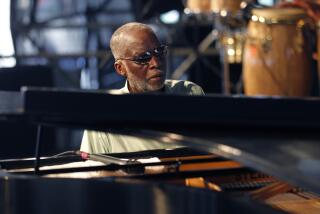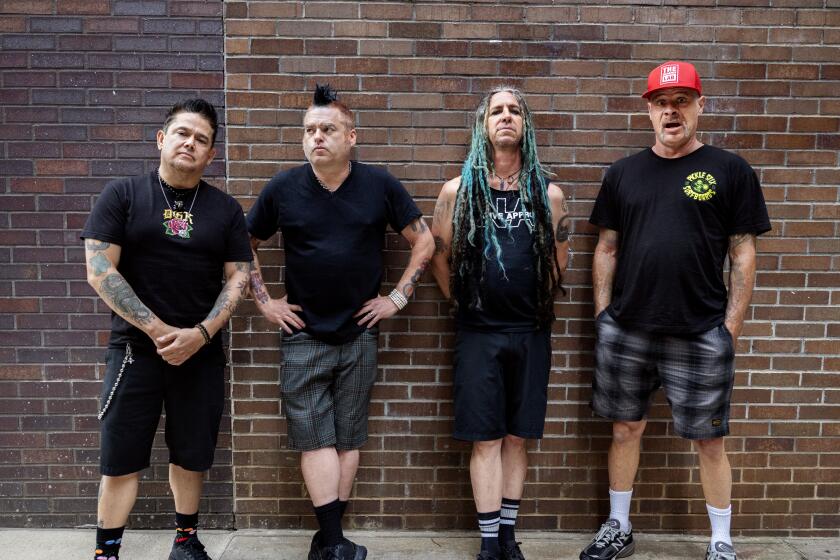JAZZ REVIEW : Some Things--Like MJQ--Never Change
CERRITOS — Those concerned that new drummer Albert (Tootie) Heath wouldchange the distinctive sound of the Modern Jazz Quartet can rest easy. Even with its first lineup change in 40 years--Heath replaces Connie Kay, who died last December--the group proved Saturday at the Cerritos Center for the Performing Arts that it’s still capable of the same old things.
In the case of the Modern Jazz Quartet, the same old things are tunes from the standard repertoire, including classics written by founding members John Lewis and Milt Jackson, all presented in impeccably clean and tasteful style.
Kay’s contribution to the group’s distinguished sound was a light touch and unobtrusive percussive ways. But his successor, a drummer from out of the bop tradition who’s worked with Dexter Gordon, Mal Waldron and J.J. Johnson, among others, is known for his kick and use of percussive color. Just last weekend when playing with pianist Cedar Walton at the Jazz at Drew festival in L.A., Heath demonstrated muscle and drive, powering his sound with persistently strong bass drum work.
At Cerritos, Heath’s bass pedal was all but ignored in favor of a lighter sound that complemented the frothy blend of Lewis’ piano and Jackson’s vibes. Reserved, evenly paced cymbal taps accompanied most numbers, with a rattle from the snare popping in here and there. Only during straight-ahead blues numbers, such as “True Blues” and Jackson’s “Bags Groove,” did Heath power up his style, and then only slightly.
The result was business as usual. Though the tuxedo-clad quartet is often said to resemble classical chamber ensembles, its program was a definitive celebration of jazz, including such tunes as Thelonious Monk’s “ ‘Round Midnight,” Charlie Parker’s “Confirmation” and George Gershwin’s “Summertime.” Only during the MJQ’s arrangement of Joaquin Rodrigo’s “Concerto de Aranjuez” and Lewis’ secular tribute “For Ellington” did the show take on airs.
The group’s opening number set the tone. It came out to a strong ovation that faded to reveal a shimmering cymbal hiss created by Heath’s mallets. As the group moved into the stately played theme of “Softly, as in a Morning Sunrise,” the drummer sounded broadly spaced stick taps on the same cymbal. When the group jumped into a swing rhythm to back Jackson’s solo, the drummer allowed himself the occasional, understated hi-hat clap and snare accent. It was as if Kay himself, the master of reserve, was playing percussion.
At times, Jackson dug so deeply into themes that some in the audience reacted with gasps and cheers. The vibist’s strongly physical, blues-laden abandon made for sharp contrast with Lewis’ more cerebral delivery.
But these roles weren’t without exception. Jackson played with demure composure on “One Never Knows,” while Lewis developed a strong blues and gospel feel during portions of his tribute to Ellington. The pianist often backed the vibist’s solos with counter melodies rather than simple chords. Jackson most often stood silent during Lewis’ improvisations.
Bassist Percy Heath, Albert’s brother, was appropriately spare and astute. Though he received the most applause for the few down-home, gutbucket lines he brought to “I Remember April,” his most outstanding work came as he strode confidently through walk rhythms, creating lyrical turns equal to the music’s melodic content.
Despite the predictable nature of its playlist, the quartet delivered exquisite performances, full of collaborative counterpoints and sterling individual improvisations.
Even with the loss of Kay, the Modern Jazz Quartet and its timeless, sophisticated sound lives on.
More to Read
The biggest entertainment stories
Get our big stories about Hollywood, film, television, music, arts, culture and more right in your inbox as soon as they publish.
You may occasionally receive promotional content from the Los Angeles Times.









